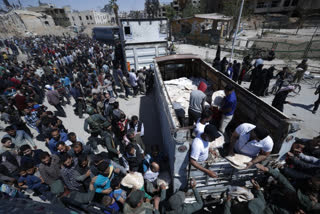Beirut:The lines stretch for miles outside gas stations in Syrian cities, with an average wait of five hours to fill up a tank. At bakeries, people push and shove during long, chaotic waits for their turn to collect the quota of two bread packs a day per family.
On the streets in the capital of Damascus, beggars accost motorists and passers-by, pleading for food or money. Medicines, baby milk and diapers can hardly be found.
With President Bashar Assad preparing to run for a fourth seven-year presidential term in the spring, some have questioned whether he can survive the sharp economic deterioration and anger in areas under his control. Poverty levels are now worse than at any point throughout the 10-year conflict.
Read:|Terrorism in Syria increasing due to external actors: India at UN
Life here is a portrait of everyday humiliation and suffering, said one woman in Damascus. Her husband lost his job at an electronics store last month, and now the family is drawing on meagre savings that are evaporating fast. The woman said she had taken up teaching part-time to help make ends meet. Like others, she spoke on the condition her identity remains hidden, fearing arrest.
With two kids and an elderly father to care for, she said life had become unbearably difficult and she is gripped by anxiety for the future. Until recently, she could smuggle in her father's medicines from Lebanon, but now Lebanon has its meltdown and shortages.
I go to the souk and have to think of priorities, buying only the bare necessities for cooking. I try not to look at the other stuff my children might like, she said.
The decade of war has wreaked unfathomable destruction on Syria. Nearly half a million people have been killed and more than half the pre-war population of 23 million displaced, whether inside or outside the country's borders, the world's worst displacement crisis since World War II. Infrastructure is in ruins.
Through most of the conflict, Assad was able to shield Syrians in the government-held territory from unbearable economic pain. Even if barely sometimes, the state kept fuel, medicine and other supplies coming and the currency propped up.
Read:|Syria reports Israeli missile attack near Damascus
Now he has gained a decisive upper hand in the war with Russia and Iran's help, his grip on areas under his control is unquestioned, and the rebellion is largely crushed.
But the economy has fallen apart with startling swiftness. It was hit by a double blow of new, far-reaching US sanctions imposed last year and the financial meltdown in Lebanon, Syria's main link with the outside world. That proved too much, on top of the strains of war, government corruption, other Western sanctions in place for years and the coronavirus pandemic.
